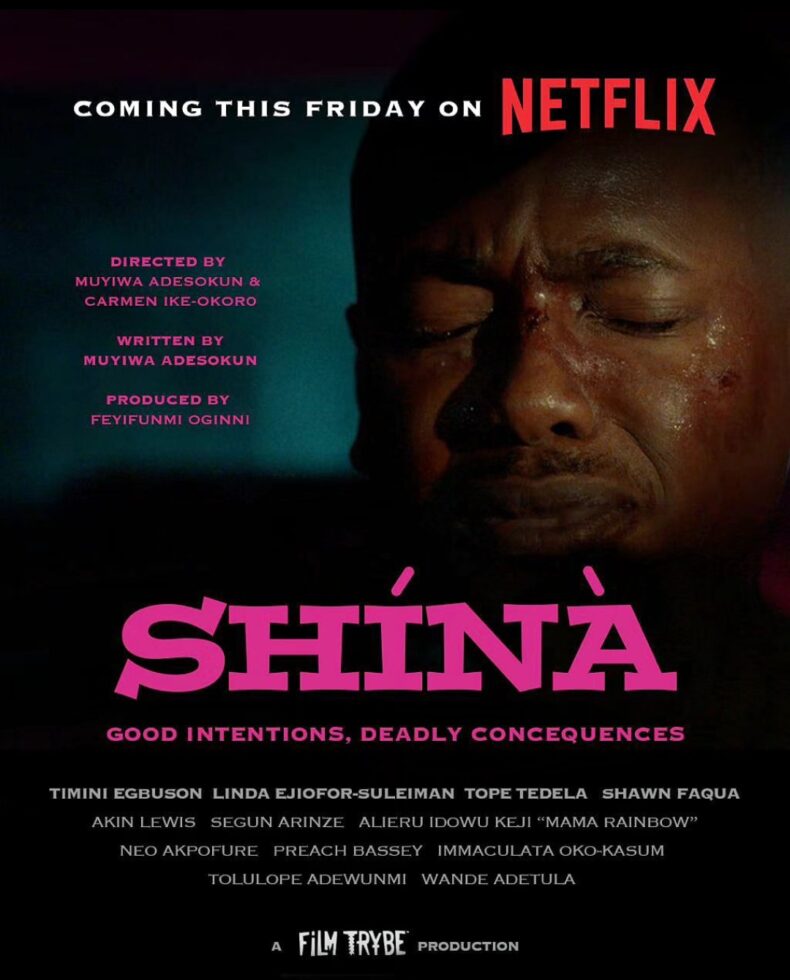Shina: A Fragmented First Attempt
Timini Egbuson, Linda Ejiofor-Suleiman, Tope Tedela, Neo Mobor Akpofure, Shawn Faqua, Kelechi “The Performer” Udegbe, Immaculata Oko-Kasum, Akin Lewis, 𝘋elroy 𝘕orman, Idowu Phillips, Segun Arinze and Preach Bassey.
Shina follows Shina Akanji as he strives to save his ailing grandmother on the eve of a gubernatorial election.
98 mins
Muyiwa Adesokun and Lillian Carmen Ike-Okoro
Timini Egbuson, Modupe Fakorede
Carmen L. Ike Okoro, Muyiwa Adesokun
2024
Netflix
The performances and the editing
The overstuffing from the subplots
Produced by Timini Egbuson, Shina follows Shina Akanji as he strives to save his ailing grandmother on the eve of a gubernatorial election. Through dialogue, the movie paints that Shina is going through reform from a life of drugs, alcoholism, and cultism; this new life sees him employed as a taxi driver.
From the first scene in Shina, the stakes are presented very high. The titular character’s grandmother is in excruciating pain as he races to get her to the hospital, this race leads him to zoom past a police officer (an act that’ll later come with consequences). Arriving at the hospital, the first set of social commentary is laid. Here, the dire state of many real-life hospitals is shown; how they’re understaffed, poorly managed, and chaotic. Amidst this turmoil, a compassionate doctor steps in, admitting Shina’s grandmother without requiring an initial deposit. With his grandmother now in the care of the hospital, Shina sets off on a desperate quest to gather funds for her emergency surgery.
Starting on a high note both benefits and challenges Shina. The film immediately captures the audience’s attention by thrusting Shina into a race against time to save his grandmother, creating palpable tension and a foreboding sense that she may not survive. This tension is kept on the ride to the hospital, arrival at the hospital, and as Shina journeys to raise money for her surgery. This gripping start resonates deeply, especially with Nigerian viewers who can relate to the urgency and desperation depicted. However, the film’s initial intensity sets a demanding pace that proves difficult to sustain. To the movie’s credit, it introduces a variety of subplots to keep the momentum but not all of these additional elements succeed. The attempt to juggle multiple storylines resulted in an overstuffed plot.
The film’s exploration of the judicial system stands out as the most compelling subplot. Many movies have tried to show police officers interacting with citizens but the approach here is one of the most authentic. There’s a palpable sense of dread that’s heightened by his delay in reaching his grandmother. The dialogue in this subplot is sharp, and the sequences are thrilling (even though it’s a little bit implausible that the officer doesn’t kill Shina when he has the opportunity, especially with Shina attacking them and the reported brutality the Nigerian police force has garnered). The police station scene also reveals further systemic corruption; the dialogue (like the officers referencing the fight that had occurred earlier) and mannerisms of the officers in this scene provide an unexpectedly humorous highlight in the film.
The backdrop of the gubernatorial election in Lagos between Azeez Bolajoko and Ali Atande plays a crucial role as a subplot. This subplot intricately links the hitman, BB, with Shina’s friend, Ugo, ultimately tying back to Shina himself. While it adds complexity and keeps the story engaging, it ends up vying for attention with the main plot. The core of Shina’s story centers on whether his grandmother will survive, and once this resolution is reached, the focus shifts abruptly back to the gubernatorial subplot. Though this subplot holds emotional weight for some characters, it is hastily concluded, leaving the ending feeling forced and more like a commentary on social issues rather than a cohesive wrap-up to the film.
Technically, Shina excels with its good editing and seamless transitions between scenes. The way the scenes bleed in and out is done expertly. However, these technical strengths are marred by noticeable audio flaws, particularly with the hitman’s character. His dialogue is often inaudible, a critical issue highlighted in the scene where he attempts to run over Shina’s friend with a car. Additionally, the hitman’s character is characterized by frequent whistling and snorting as a gimmick, but the dubbed whistles come across as grating and unnatural. This effect detracts from the immersion, and either authentic whistling by the actor or the complete removal of the whistles would have been preferable.
Camera angling plays a crucial role in enhancing a movie scene by establishing mood and atmosphere which influences how the audience perceives and emotionally connects with the story. A prime example of this is the film’s most emotional moment, where the doctor grieves for her fiancé in her office. Unfortunately, the camera work in this scene is poorly executed. The use of a high, ceiling-wide shot creates a detached perspective, distancing the audience from her profound sorrow. This scene demands a more intimate approach, one that invites viewers into her grief, allowing them to fully empathize with her loss rather than being shut out. It’s tone-deaf for the audience to not be able to share in the emotional peak of this movie after we’ve followed the dynamic of the doctor and her fiance through their shared calls and texts.
There’s a value that can be provided when a movie is met with a singular vision by its director. The way Shina meanders gives the feel that this is due to this movie being helmed by two directors. This fragmentation shows the importance of a singular, coherent vision in filmmaking, where the director’s singular guidance can ensure a harmonious blend of storytelling, visual style, and emotional resonance.
The performances in Shina are solid for the most part. Timini Egbuson is an engaging protagonist, and although there’s a draw from not truly knowing his character (mostly his past and how it informs his present) this isn’t due to his portrayal. Idowu Philips delivers a pitch-perfect performance as Shina’s grandmother. Linda Ejiofor-Suleiman also delivers an adequate performance and even with the challenge of the camera angling, she delivers a compelling emotional peak. Akin Lewis, too, makes the most of his character, contributing effectively to the film despite its flaws.
In conclusion, Shina ambitiously tackles multiple themes and delivers a high-stakes story that resonates with urgency and emotion but it falters due to fragmented direction and uneven storytelling. Despite its flaws, Shina manages to offer a compelling movie experience.








